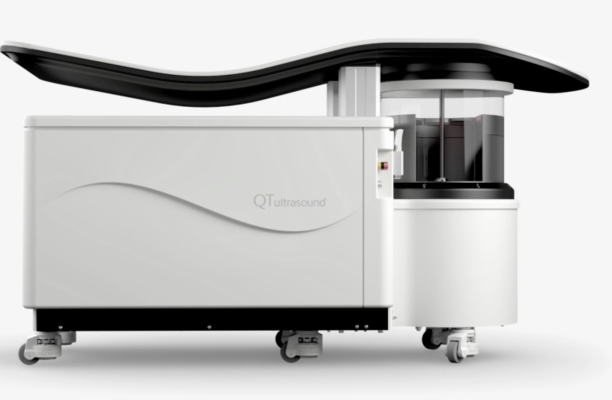
March 18, 2024 — QT Imaging Holdings, Inc., a medical device company engaged in research, development, and commercialization of innovative body imaging systems, announced the delivery of a Breast Acoustic CT Scanner under a unique collaboration with the Department of Radiation Oncology, and Radiation Treatment Program at the Sunnybrook Health Sciences Centre in Toronto, Canada, one of the largest cancer centers in Canada, and The University of Illinois, Urbana-Champaign, Department of Electrical and Computer Engineering and Grainger College of Engineering. This collaboration is part of a five-year research grant from National Institutes of Health/National Cancer Institute to develop an inexpensive, portable, safe, and repeatable imaging approach capable of accurate and early identification of response of breast cancer patients to neoadjuvant chemotherapy (NAC).
As part of this grant, Breast Acoustic CT (ACT) quantitative images with independent biomarkers known to be sensitive to cancer will be collected, and the response of cancer to therapy, will be derived from quantitative ultrasound based on backscatter analysis. The successful results of this collaboration will yield additional quantitative markers (radiomics) with improved estimate precision not afforded by conventional ultrasound scanners.
This collaboration also addresses the ongoing clinical need in breast cancer therapy for the development of an inexpensive, robust, and accurate technique to identify the response, within weeks, of breast cancer to neoadjuvant chemotherapy. The early identification of non-responders to NAC or any cancer treatment remains a highly significant medical problem and necessary for adaptive precision medicine.
"The QTI Breast Acoustic CT System represents the future of tomographic imaging, offering quantitatively accurate, 3D, high resolution breast images, taken with no safety or discomfort for women," said James Wiskin, PhD, Principal Scientist and QTI Fellow. "The ACT system is especially appropriate for dense breasts and young women with risk factors. This partnership serves as a testament to collaborations between leaders in industry and academia."
"Unfortunately, not all therapies work in cancer patients and the ability to determine which are effective and which treatments are ineffective in days instead of months is very important. With the QTI Breast Acoustic CT System we plan to implement quantitative ultrasound methods which can be used for exactly that kind of determination to enable personalized care," stated Greg Czarnota, MD, PhD, Clinician Scientist Department of Radiation Oncology at Sunnybrook Health Sciences Centre in Toronto, Canada.
For more information: www.qtimaging.com


 August 09, 2024
August 09, 2024 








